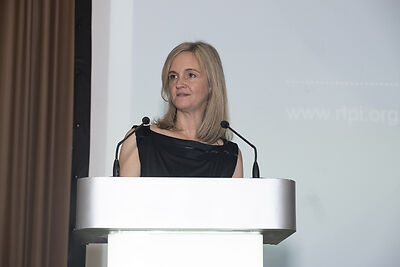Rhian Brimble MRTPI is a Policy Officer at Royal Town Planning Institute Wales
A new paper released today by Royal Town Planning Institute (RTPI) Cymru discusses the concept of ‘living locally’ asking, can the ‘15 minute neighbourhood’ model be applied to rural Wales?
 The paper explores whether the guiding principles of the ‘15 minute neighbourhood’ model can apply to remote, rural areas, and what the role of planners and the planning system would play within this model.
The paper explores whether the guiding principles of the ‘15 minute neighbourhood’ model can apply to remote, rural areas, and what the role of planners and the planning system would play within this model.
The question is increasingly being asked, if the originally urban ‘15 minute neighbourhood’ concept has more to offer. At the RTPI, we want to know whether the basic principles of this model could provide a guide for a more sustainable, holistic, place-based focus for rural areas in Wales.
Heightened by the pandemic, planners and stakeholders are looking at alternative methods for addressing pressures and opportunities in rural areas, as well as tackling key issues such as the climate, the environment, the economy, society and health.
The 15 minute neighbourhood model aims to encourage and support communities to access their daily goods and services locally, by sustainable means. This of course becomes more complex in a rural context. The paper therefore considers the concept, without the set measure of a timeframe or distance, using ‘local’ as a more fluid term.
Though originally developed as a model for cities, when applied to rural areas, the model is a useful tool in re-enforcing a local focus in planning policy and decision making and the adaptable nature of the concept of living locally means it can evolve to suit the individual place, considering the local context and what makes it distinctive. A flexible approach would be essential for different contexts and localities.
To establish whether this model would work within rural Wales, RTPI Cymru considered the ecology, proximity, solidarity of the area. Researchers then looked at whether these principles would fit within the provisions set out in the Well-being of Future Generations (Wales) Act 2015 and the rural policy framework set out in Future Wales and Planning Policy Wales, along with Well-being Indicators, the National Sustainable Placemaking Outcomes and Placemaking Charter Principles.
The project concluded with several recommendations:
- A need for a more outcome focused performance measurement to support the delivery of sustainable rural places.
- Support for joint and collaborative working, involving planners from the outset.
- Improved connections between locations to services and facilities.
- Support for local planning tools such as community led Place Plans and community engagement.
- Good practice shared across rural authorities along with continued investigation, discussion and learning on how planning can support living locally in rural Wales.
This paper aims to initiate a discussion in Wales on the opportunities, and different impacts of living more locally in rural Wales and how planning can embrace this. RTPI Cymru would be pleased to receive feedback from members, and looks forward to discussing the issues around Living Locally in rural Wales at the RTPI Cymru Spring Conference in Deganwy on the 30th March 2022.


